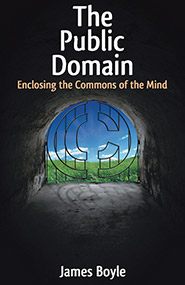A couple of months ago I mentioned that Eva Hemmungs Wirtén was soon publishing her second book on the public domain. Her production, writing and depth makes her one of the foremost public domain scholars around today. The very fact that she is a Swedish humanities scholar publishing in the English market seems to make her an exotic addition to the scholarly publication. This should not be so considering the ability to think and writes exists widely outside the larger universities and the web provides and excellent infrastructure for the spreading of knowledge. So could it be that there is a bias towards certain universities and university publishers?
Anyway her second book Terms of Use: Negotiating the Jungle of the Intellectual Commons (University of Toronto Press) is now out and it has already been reviewed by David Bollier on his blog. Bollier gives the book a glowing review and writes about Eva:
Wirtén, a professor at Uppsala University in Sweden, is developing a sophisticated new frontier of public domain scholarship… Wirtén’s book is a welcome addition to the literature on the public domain... Terms of Use is highly readable and even entertaining.
And she deserves this praise. I read Terms of Use with fascination, letting the author guide me from the familiar early history of property theory – a story populated with white colonialists declaring the right to take land from natives who did not use it. This reminds me of the comic Eddy Izzard who has the following sketch in his Dress to Kill tour
We stole countries. Thats how you build an empire. We stole countries with the cunning use of flags. You just sail around the world and stick a flag in.
“I claim India for Britain”.
And they go: “You can’t claim us, we live here, 500 million of us”.
“Do you have a flag?”
“We don’t need a bloody flag, this is our country you bastard”.
“No flag, no country – you can’t have one. That’s the rules”.
(check it out on youtube in particular this version which has a lego animation). Anyway back to the book. Eva then boldly goes where the familiar story has not gone before. Exploring the parts of the public domain which should be familiar but are not. The history of lopping as a right, the imperialistic problems with Kipling, the origins and political significance of botany, botanical gardens and taxidermy.
From these wide sources she deepens our area of study, forces us to go beyond the simplistic terms and understanding of the public domain as a modern romanticization of a confusing past. We need work like this to be able to understand what it is we are actually talking about. Go get the book and read it. Oh, and if you have not done so read her first book as well No Trespassing: Authorship, Intellectual Property Rights, and the Boundaries of Globalization.


